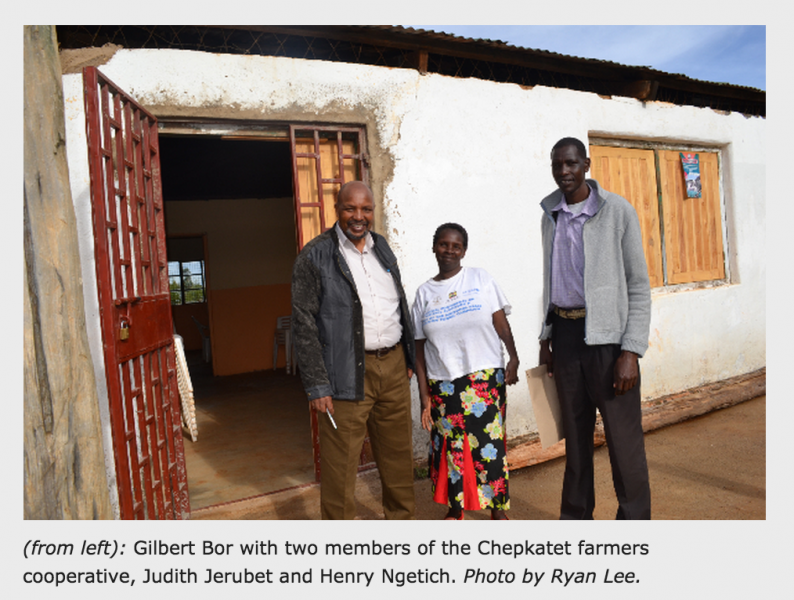 In Western Kenya on the outskirts of the town of Eldoret lives a farmer who dreams of creating a more prosperous community. But he is no ordinary farmer. Gilbert Bor and his family live next door to the farm on which he grew up, but he has travelled globally and his experiences from around the globe have helped inspire his vision for his community and for his country.
In Western Kenya on the outskirts of the town of Eldoret lives a farmer who dreams of creating a more prosperous community. But he is no ordinary farmer. Gilbert Bor and his family live next door to the farm on which he grew up, but he has travelled globally and his experiences from around the globe have helped inspire his vision for his community and for his country.
When he is not busy tending to his own land or teaching business and marketing classes at a nearby university, Gilbert can often be found organizing or serving in his community. He is heavily involved in the world of education, where he sits on several boards at both the local and the national level, but it is Gilbert s role in agriculture that has brought him international acclaim. He has been published in both journals and in newspapers such as the Wall Street Journal where he has been outspoken on the need for greater access to hunger fighting innovations, especially genetically modified crops. He has also been a Borlaug Dialogue speaker, bringing his perspective as a smallholder farmer to one of the most important audiences in agriculture. But perhaps most impressively, Gilbert has dedicated himself to giving back to his community and manages to somehow find time to help farmers in his area move towards a better future.
Gilbert and his wife Scholastica, who is also very active in the community, know well the difficulties facing farmers in the region. The first is a lack of access to technology, then a lack of knowledge, and then climate change, Gilbert says when asked to name the biggest of them, but if you address the first two, then the farmer can adjust and deal better with the third.
This is the idea behind the Chepkatet farmers cooperative society, which Gilbert recently founded, and whose mission it is to equip farmers with the tools needed to overcome the challenges they face. By leveraging their collective power, the farmers are able to gain access to credit at premium rates and negotiate better prices for both purchases and sales. Just as important though, the collective serves to bring new knowledge to low skill farmers. If everything works out in the long run the way Gilbert foresees, co-op members could see their profits rise dramatically. Gilbert sees the untapped potential of the people to organize in order to gain greater access to resources and markets. I have a good education, he says. I am well-travelled, and I know what can happen when people work together. Indeed, his efforts have already begun to bear fruit and have set the stage for a dramatic improvement in the community.
The co-op itself consists of only about one acre of land, on which sits a building donated by the county government. Inside the mostly empty structure is a large milk cooler that will be used by all of the dairy farming members to extend the freshness of their product and enhance its marketability. Gilbert sees a fully automated system in the future, bringing truly modern innovation to this community. When the farmers deliver their milk, he explains, the information will be fed right into the computer system. Milk sales will also be tracked electronically, enabling a streamlined system of accounting. Soon, he hopes the building will also be home to a machine pool, with tractors, harrows, and planters for the members to use. They will pay only for their personal use of the equipment while the machines will be maintained in common. Near the cooling house, Gilbert is planting demonstration plots to teach best practices to the farmer members. He also plans to use some of the land to produce saplings of fruit trees to give out. All of this is, of course, not-for-profit. Other cooperatives in the area are run like small businesses, where members have to buy in and purchase shares in order to reap the benefits of membership. We wanted people to be able to see the difference, Gilbert explained.
One thing which the co-op will not be able to do, at least this point, is distribute any genetically modified seeds. Since 2012, there has been a national ban in Kenya on the importation and cultivation of any genetically modified crops. Mr. Bor is among a growing chorus in Kenya calling out for access to innovation. When asked about genetically modified crops, he says that they are the answer to the question of how to help raise average farmers out of poverty. Kenyans already know they must use them. Every year, farmers are coming to me and asking what is the newest seed? It is not farmers who will oppose them. Farmers will choose what is best for their community, their families, and their pockets. We have seen some of what those seeds have done in other countries.
Ultimately, Gilbert Bor believes in Kenya s ability to move toward a brighter future. We want a hand up, not a hand out, he told me, as we discussed his vision for future development. And surely, Mr. Bor is a living example of just the kind of hand that can help pull communities out of poverty. Despite his many obligations to his family, his farm, his students and his university, he still finds time to give back to his community. I think to myself, what is my value to the community if I don t? Indeed, Gilbert Bor stands as a pillar in the community, and it is pillars like him upon which the future will be built.
